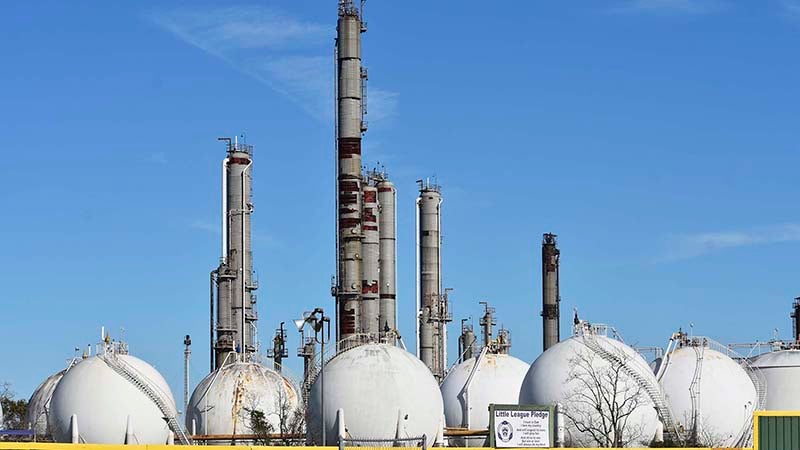Fire’s out; what’s next? Response measures at TPC ongoing, as are concerns
Published 4:22 pm Wednesday, December 4, 2019

- Towers and tanks from the TPC Group Port Neches Operations plant are visible from the Port Neches Little League baseball fields. (I.C. Murrell/The News) 12-2-19
Although the last remaining fire at the TPC Group Port Neches Operations has finally extinguished, cleanup efforts continue, the need for emotional support and stress management still abounds and questions are lingering.
Chief among the questions is: What caused TPC to explode twice, leading to a week of mayhem for residents within a short radius of the chemical plant?
The booms had an effect on residents across Port Arthur. A trail of smoke traveled southward across the city’s sky shortly after the initial explosion Nov. 27 and traces of butadiene and volatile organic compounds were detected.
“Those things cause smog, they cause respiratory distress and shortness of breath,” said John Beard, an environmental activist from and former petrochemical industry worker who lives in Port Arthur. “The readings can vary by just a few feet. The problem you have to understand is, what is it at the source and what is it burning? All these plants, they have a chemical inventory that tells them whatever’s in there, down to a bottle of water. So, to say what’s on fire when you know what happened from your operators, you know what chemicals you use and what products you make. It’s no way you don’t know this. And all those products they make, the C-4s and 1,3 butadiene, those are known carcinogens.”
By 2:30 p.m. Wednesday, 43 detections of 1,3 butadiene with a maximum reading of 0.47 parts per million were found out of 1,562 readings within a 24-hour period.
Beard addressed his concerns to the Port Arthur City Council this week. TPC produces crude C-4, butadiene, butene-1, fuel products, polyisobutylene and isobutylene derivatives. C-4, or Composition-4, is a plastic explosive.
At 4:17 p.m. Wednesday, Unified Command issued this statement on the condition of the air quality:
“We remain diligent to continue monitoring air quality around the facility and in the community. Monitoring results continue to indicate no human health concerns in the community at this time.”
But by 6:08 p.m., a text from the Southeast Texas Alerting Network was sent asking residents to shelter in place.
“Due to the current wind conditions and on-going activities at the TPC site, there are elevated levels being measured for 1,3-Butadiene,” the text reads. “As a precaution, we are recommending sheltering in place until 6 a.m. in the morning. The situation will be evaluated through the night.”
As a result, the Port Neches-Groves Independent School District canceled classes for the remainder of the week.
Beard suggested Port Arthur officials consider establishing an environmental compliance department to address such matters and protect neighborhoods near the city’s refineries.
Port Arthur Mayor Pro Tem Harold Doucet said the council does not take lightly any health concerns resulting from refinery or chemical plant operations.
“Our fire departments coordinate and work with other fire departments, just like it happened in Port Neches and everybody rallied to Port Neches, everybody’s going to rally to Port Arthur,” he said.
An “all clear” has not been issued yet, according to TPC officials, as response measures are ongoing. Unified Command continues to operate on a 24-hour basis, and water suppression across the process area continued to run at 6,000 to 8,000 gallons per minute, according to the Environmental Protection Agency.
The U.S. Chemical Safety and Hazard Investigation Board has deployed personnel to TPC for investigation into the incident.
Contacts for assistance
TPC is providing an emotional support hotline staffed by Samaritan Counseling Center of Southeast Texas. The hotline, 409-727-6400, ext. 250, will be available daily from 9 a.m.-6 p.m. Any calls received after hours will be directed to Spindletop Crisis Hotline at 800-937-8097.
Additional in-person follow-up sessions with counselors also will be available. Counseling calls and session discussions are kept confidential.
Claims representatives are visiting area residents and focusing on homes in the area of high impact. The reps are in the field from 8 a.m. to one hour before sundown each day.
To make evacuation related or property damage claims, or if you see debris on your property, call the Community Assistance Helpline at 866-601-5880. Environmental response specialist firm CTEH will visit those who call about debris and are leading removal efforts. Residents are asked to not pick up debris.
Texas Gas Service: We can’t inspect
Texas Gas Service recommends to residents that they call a qualified contractor to inspect internal piping and appliances, as the service cannot make inspections.
“We recommend discontinuing use of any natural gas appliance if damage occurred,” TGS says in a Twitter post. Anyone who smells natural gas is asked to leave the area, call 911 and TGS’ emergency line at 800-959-5325.
“Don’t smoke/use electrical equipment until you are a safe distance away,” TGS continues. “During cleanup, be aware of natural gas meters/pipelines. Before you dig or remove trees, call 811 to have underground utilities located for free.”
Water quality
The water quality around TPC remains normal, TPC said Wednesday. The company added the Texas Commission on Environmental Quality, the Environmental Protection Agency and CTEH have confirmed no visible impact to the Neches River.
Texas Parks and Wildlife have reported a moderate impact of an unknown cause to fish in the Wastewater Canal, according to TPC.






